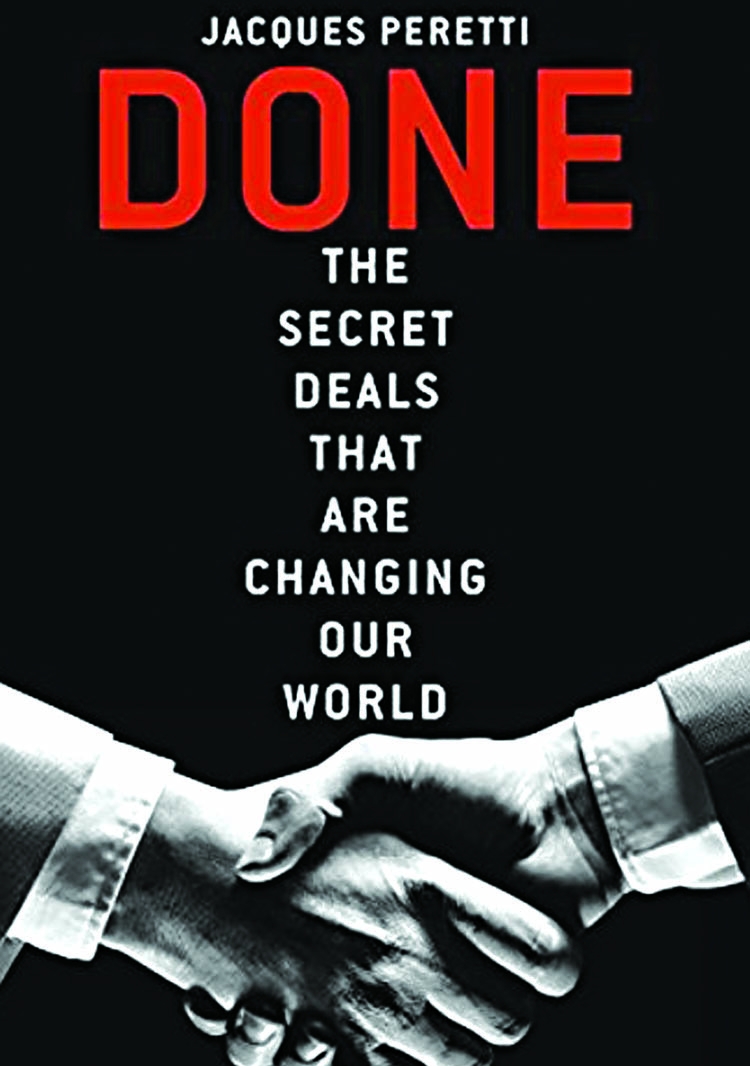Published: 12:46 AM, 05 November 2017
Fit, obese or insecure?
 Done: The Secret Deals that are Changing our World by Jacques Peretti, Publisher - Hodder & Stoughton, published in July 11, 2017.
Done: The Secret Deals that are Changing our World by Jacques Peretti, Publisher - Hodder & Stoughton, published in July 11, 2017. Pratik Kanjilal reviews a lively introduction to the most disturbing questions of the modern world that reveal by the author.
Every time a new Jacques Peretti book hits the stores, a collective groan rises from reviewers in his native England. Though he depends on fairly extensive reporting, he is regarded as a crank who rashly goes beyond the story - the Erich von Daniken of the capitalist world.
This book, too, will cause some hollow groans to ascend into an uncaring universe, but if you ignore the conspiracy angle, it's an enlightening read. The 'done' in the title is completely valid, for understandings and agreements that underlie the world economy, and some of them are so unnatural that they could be regarded as mass delusions. The tacit agreement that money is value, for instance - the moment the agreement collapses, money is dirt.
But the subhead is misleading - 'secret deals' and conspiracies are rare in the mainstream. Capitalist enterprise follows its own logic transparently, and it is a little at odds with the public good. In fact, the content of Peretti's book is itself an argument against secrecy. The very people who use mass psychology and ruthless business strategies to influence our lives are completely open about it. Many of them have been interviewed for the book, and seem to have spoken freely.
But if we discount the conspiracy angle, which is the exception rather than the rule, Peretti's book provides an excellent crash course on the ways in which the arts of buying and selling influence our lives, and an introduction to the people who make it happen.
They range from the psychologist and marketing guru Clotaire Rapaille, who saw civilians buying Hummers out of insecurity after 9/11, and foresaw the SUV boom, to Louis Dublin, a statistician with Metropolitan Life who intuited that you could tilt the board of the insurance game by moving the line between 'overweight' and 'obese' categories of customers.
Peretti gives them more credit than they deserve, though. The reader comes away from the interview with Rapaille with the impression that he dreamt up the concept of a 'reptile brain', a phylogenetically primordial artefact posited as the seat of fears, which overrides the higher centers to make irrational buying choices.
In this case, it is the 9/11-fuelled urge to buy an SUV because it looks like a tank, though a sedan with a lower center of gravity would be safer. However, the reptile brain was part of the 'triune brain' concept which had preoccupied the neuroscientist Paul D MacLean since the 1960s, and which gained a mass audience in the next decade through Carl Sagan's The Dragons of Eden.
Similarly, Dublin is credited with the innovation of Body Mass Index in 1945, a measure which, apart from helping the insurance companies to bet more intelligently against the customer, also sparked off the gigantic wellness industry, the finest mass delusion that human civilization has ever produced, with the possible exception of Ganesha drinking milk.
However, while Dublin may have produced an index of his own, the concept was created by the Belgian polymath Adolphe Quetelet in the first half of the 19th century, and the present ratio of body weight (not mass) to the square of the height was laid down in a 1972 paper by Ancel Benjamin Keys and fellow researchers.
Peretti turns his attention to the work of Keys later, with good reason. He portrays Key, who conducted starvation studies on conscientious objectors, as a mad scientist like the Japanese who used prisoners of war to study frostbite in Manchuria.
That's a bit unfair, but on the other hand, Keys was the man behind wartime K-rations, which mutated into the modern energy bar. He also created the Mediterranean diet, which has put food on the families of so many health writers, to borrow a colorful phrase from George W Bush. And yet, he was the researcher who predicted that the body's wiring caused diets to be cyclical, from fat to fit and back again, over and over again. That is the fail-safe business plan of the diet industry.
Despite the hiccups, Done is a nice introduction to the most disturbing questions of modern times. Why is cash being pushed out by government policy, not only in India but in Scandinavia, too? Is it because non-cash transactions benefit middlemen? Why do we take more pills in a year than our grandparents did in a lifetime?
Are we healthier than they were, or are we being preyed on by freshly defined diseases like attention deficit disorder, which are easily monetized? Most importantly, is the economic order about to be eclipsed, generating more monetisable fears?
The most interesting study in the book is that of Tobias Levkovitch of Citigroup, who foresaw the increasing income inequalities which we now regard as normal, and urged his clients to invest for a polarised world. Maseratis and improbably overpriced holiday resorts for the rich, and zero-hour contracts, payday loans, savage retail discounting and booze for the poor.
These trends have been visible for some time, but the other side of the coin is more interesting: what will the shrinking of the middle class, on which politics and policy have focused for a decade, do to our civilization? If the trend holds, the consequences will be anything but boring.
The reviewer is Associate Editor of Indian Express.The write-up has also appeared on www.indianexpress.com
The reviewer is Associate Editor of Indian Express.The write-up has also appeared on www.indianexpress.com




